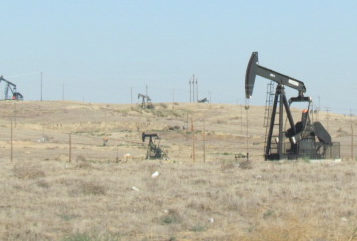UPDATE: A.B. 1299 did not pass amidst the chaos of Friday's legislative session, but it could be revived next year.
A last-ditch attempt to carve out an exemption from state requirements to monitor toxic air emissions from oil refineries is making its way through the legislature. A.B. 1299 is a gut-and-amend - meaning the bill started life as one thing (in this case, a bill about paying volunteer firefighters) and at the last minute was amended to address something else, as a way to get around deadlines.
All bills must pass both the Senate and the Assembly by tonight. The new version of A.B. 1299 was introduced on Tuesday, and has already passed the Senate Environmental Quality Committee. It can't be heard on the Senate floor until this evening, because bills have to be "in print" for 72 hours before they can be voted on. But after that it could potentially make a quick trip through the Assembly Natural Resources Committee and back to the floor of the Assembly.
Gut-and-amends are underhanded, but the outcome is not always terrible - some good bills have used similar tactics - but in this case the intent seems to be to get something past the legislature without giving time to consider the consequences.
In A.B. 1299, Assemblymember Rudy Salas (D-Bakersfield) and Senators Shannon Grove (R-Bakersfield) and Melissa Hurtado (D-Sanger) seek to create an exemption that seems to be applicable to a single refinery in Kern County (it might apply to more than one - but that information is hard to ascertain at the last-minute pace of this bill). The company in question, Kern Oil & Refining Co., told the Senate Environmental Quality Committee that having to monitor its emissions would cost it between $1.5 and $3 million, and that the original legislation was never intended to apply to small refineries.
Except it was. Al Muratsushi, the author of A.B. 1647, which is the bill - now law - the oil company is trying to get out from under, told CalMatters that “the intent of the bill was to cover all communities surrounding refineries.”
A.B. 1299 would exempt refineries that process less than 55,000 barrels of crude oil per day and are near communities of less than 3,000 residents from having to monitor their emissions. The Kern Oil refinery is close to a small rural community. It currently processes 26,000 barrels of crude per day - so under A.B. 1299 it could potentially double its production and still be exempt from having to monitor and report on its emissions.
"The company is trying to portray themselves as a small refinery," Adrian Martinez, an attorney with EarthJustice, told Streetsblog. "But a small refinery is still a big company. They're making millions of dollars selling oil."
"That's the disadvantage when something is rammed through," he said. "People can't understand what's going on."
And A.B. 1299 only calls for monitoring and reporting. "We don't understand what they want to hide," said Martinez. "They've had two years to pass legislation; there's some reason they waited."
"They didn't think we'd be able fact check them," said Katie Valenzuela, of the California Environmental Justice Alliance.
But they did. The company has fines for worker safety violations and numerous clean-air violations. More info here [PDF].
Meanwhile the bill's authors are stressing "fairness" (because this "small" oil refinery is subject to the same rules as larger ones) and jobs.
If A.B. 1299 passes on the Senate floor tonight, there will be an opportunity for opponents - including a long list of environmental and justice organizations, along with the American Lung Association, the California Air Pollution Control Officers Association, the Coalition for Clean Air, and the Sierra Club - to address these concerns at a committee hearing tonight.






